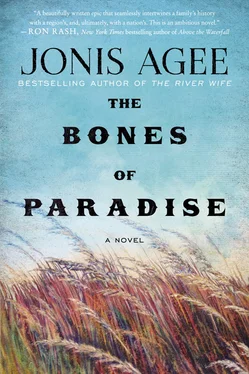It was eight miles back to the ranch but it seemed a thousand to the men flanking the foreman’s horse, burdened with its double load. The sky had dropped into the darkness of extinguishing stars when they finally entered the ranch yard. Tired horses shuffled and sighed as they made their way to the barn. Jim and Willie stepped down with Higgs and Larabee outside the main house and unlashed the body, and while Willie held the gate, J.B. was borne up the brick path. They hesitated at the door. Higgs reached to rap his knuckles, and then realized the person who granted permission to enter was dead in their hands. He turned the knob and pushed it open. The room was dark. The boy asleep upstairs, Higgs’s wife, Vera, likewise asleep in the foreman’s house, some four hundred yards away.
“Wait.” Higgs turned and felt his way through the dark to a kerosene lamp on the small table between the sofa and reading chair, found the sulfurs beside the lamp, and lit the wick. As soon as the gold glow pushed back the shadows, Higgs gestured, and the men brought the body to the brown-speckled cowhide sofa and carefully lowered it. Later the hide would bear the dark smudge of Bennett’s blood, but it never occurred to anyone to get rid of it.
The men stood looking around the room, hats in hands, clearly uncomfortable to be in their boss’s good parlor and in the presence of his body.
“Go on. Irish Jim, you take care of Graver’s wound, but make sure you tie him to the bunk. Late call tomorrow; get some sleep.” Higgs grimaced, laid his hat on the table beside the lamp, and promptly picked it up again. Larabee let the others pass, then looked over his shoulder at Higgs, who nodded.
At first, Higgs thought about going upstairs and waking Hayward with the news, but he thought better of it. You always knew bad news soon enough. Best to sleep while a body could. He glanced at the dead man, startled by the fact that the eyes had closed, as if he could finally be at peace now that he was home.
“Okay.” Higgs breathed deep and sat in the big, overstuffed chair upholstered with a burgundy plush that had worn thin and dark on the arms and back where J.B.’s head had rested for years. The wife’s doing. Something called “Turkish Victorian,” all done up with tassels and fringe the dogs and boy had taken turns pulling off until the furniture sat like aging relatives, fat and old-fashioned, beside the dainty mahogany table with claw-and-ball feet and carved foliage up the legs. An heirloom from her family, J.B. had noted with a touch of humor one night. That, and the whatnot corner thingy that held Hayward’s Indian relics and the silver belt buckle he’d won riding goats at the ranch rodeo when he was ten.
Higgs glanced back at the body, examined it more closely in the light now that he was alone. The chest wound was ugly. They were always ugly. He pulled up the lace antimacassar pinned to the chair arm, leaned over, and placed it across the wound. “Look like a damn preacher now,” he said. “Sorry, J.B., Jesus,” he hastily amended, his eyes filled.
“That’s enough,” Higgs whispered as the wet on his grizzled cheeks dripped down to darken the collar of his flannel shirt. “Sorry.” He looked at his scarred hands, the permanently swollen knuckles, the index finger he couldn’t straighten, beset with a trembling that wouldn’t stop as it made its way up his arms, into his chest, his shoulders, and down his legs until he felt like he was about to shake into pieces, but still he held the great sobs within, releasing only the faint hissing sound of boiling water as he wept.
It was almost seven the next morning when the door opened and shut, waking Higgs to his wife’s light tread. She looked straight toward the kitchen, and thus missed the figure of her husband next to the body of their employer.
Higgs considered calling her, but she was already banging pots, starting the coffee, firing up the woodstove, humming softly, with the occasional chiding word for her own mistakes. Soon there was beef frying, biscuits rolled, and eggs whipped. She’d stop cooking once she heard. He knew she would. So he kept quiet. The men needed to eat. First and foremost, you fed stock and men.
The parlor was much the same as it had always been, Bennett being a simple man and his wife, while she’d lived there, not a fussy woman. There was lace on all the chairs and it hung in the windows—though it didn’t do a damn thing to keep out the cold. Rather than newspaper and catalogue pages covering the walls for warmth as in the bunkhouse, the parlor walls were papered with garden flowers and framed pictures of sour-looking people from her family out East. Chicago, was it? Cleveland? Higgs couldn’t remember. Why hadn’t she taken her pictures with her, he wondered. And the kerosene lamp—he looked over, it had long since burned out—with the big pink cabbage roses on the two globes. He understood about the furniture—except maybe the little table between the two hulking pieces. The table’s rich, dark finish glowed from the beeswax Vera rubbed into the wood.
But the rest of the stuff—even the piano covered with that tasseled scarf—why hadn’t she shipped it home? Unless she planned on coming back or came from a place with things twice this good. He glanced at Bennett. That was probably it. It was sixteen years ago when that bad spell of luck came along and they damn near lost the place the first time. Cattle got screwworm, blackleg, scours, and every other damn thing they could think of, horses colicked or broke legs, and it stopped raining. Grass didn’t green in spring. They were bleeding money and stock, J.B. told him. But in the middle of it Bennett and his wife went off for a month, then came home, a load of furniture and junk in a wagon behind theirs. Within a couple of months they were buying stock to replace what they’d lost and eating store-bought food when the garden died. The younger son was born six months later.
As other spreads went under, Bennett’s thrived, with enough money to buy surrounding land at rock-bottom prices. It didn’t take a schoolteacher to figure out the arithmetic. Even after the past years of drought proved almost fatal for the ranch, these days any number of men nursed a healthy dose of envy and dislike for Bennett. What would happen to Hayward now? At fifteen he still acted the boy, no hand at all with the stock and a joke to the men. Damn Bennett for getting himself kilt. Higgs sought the end of his mustache and brought it to the corner of his mouth to chew, a habit he’d developed of late since he gave up whiskey and tobacco for his wife.
He thought again of the boy asleep upstairs. He sighed and rose, straightened stiffly and held the small of his back until the grabbing pain reluctantly released. Best get this done before the men came up for breakfast.
Opening the bedroom door slowly didn’t stop the hinges from squealing. Higgs froze in the hallway, waited to see if the boy would say something. Surely he was awake now, but when he pushed the door open the rest of the way and looked inside, the room and bed were empty in the dusty light. The lace window curtains were flung up over the rod, and the window gaped. A brown moth, stranded in the rising sun, fluttered weakly and tried to climb the inch from the frame to the sill. Upon closer inspection, Higgs realized the bed hadn’t been slept in, although a body had at some recent time dented the blankets and pillow. The thought wormed into him that maybe he should be worried.
It was a boy’s room to the extent that it contained the dusty trophies of hunting trips—antlers, brushes of rabbit, squirrel, fox, and deer, tail feathers of pheasant and turkey, and the two-foot span of an eagle’s wing nailed to the wall. Higgs remembered that one—the boy shot the huge bird accidentally, he said. Bennett made him nail the wing to the wall over his bed so he had to endure the sweet rot as it slowly decayed to teach him a lesson, and Hayward never said a word. He kept the window open for the next year, even when it was thirty below zero last winter, so cold your snot froze your nose shut and stung your eyes, then froze the tears to your lashes. Maybe the boy was more like his father than either imagined.
Читать дальше












